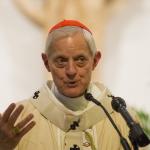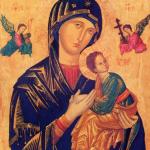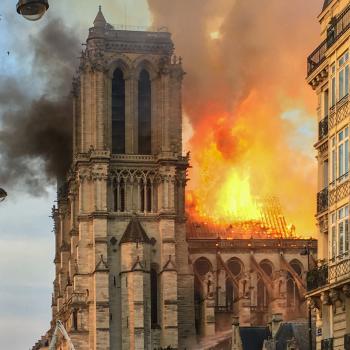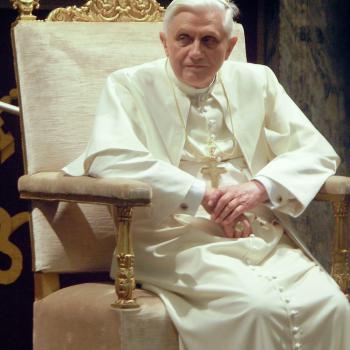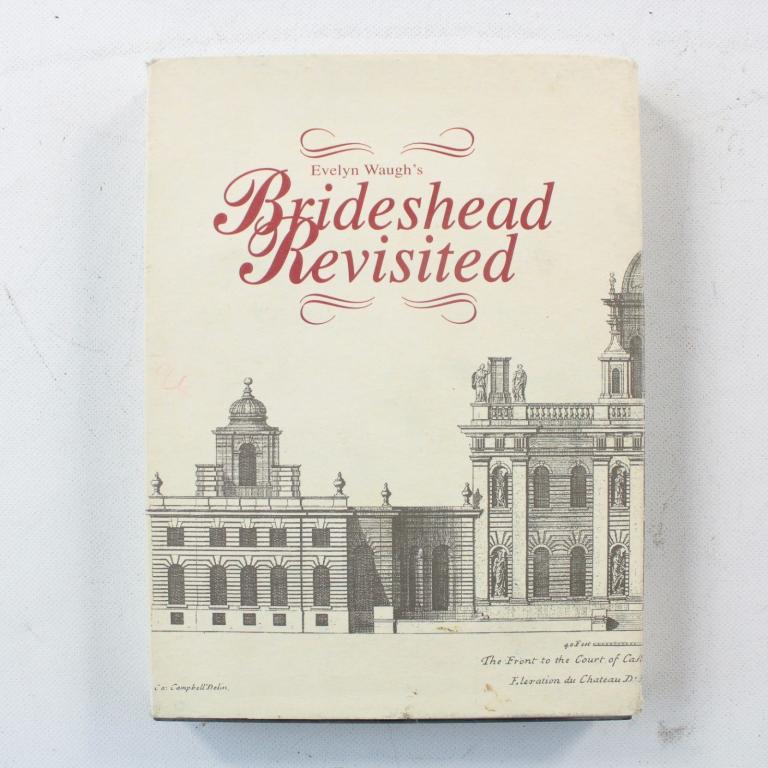
For reasons that will become clear, I am unable to reveal too many details about this priest, which is a shame because it is not too much of a stretch to say that he put me on the trajectory toward becoming Catholic. However, I also am not his confessor. I do not know the details of his own life and would be surprised by nothing, if it ever came to light, mostly because I am not surprised by anything anymore. I am also not an abuse victim, so perhaps some may see me as naïve, but as I said in my last post, I am also not unfamiliar with church scandal. All I am saying is that our friendship has provoked in me a great deal of reflection about the personal integration that is required to live a chaste life. I have no idea if he was always successful at chastity, but I have long assumed that all Catholic priests were celibate and successfully so. I now know that I was incorrect about that assumption, but I still assume it of him because I have no knowledge to believe otherwise. In fact, the story that I tell suggests that he is rather successful at celibacy. In any case, the stories that I will tell about him are not sordid, so if his identity ever got out, I doubt that there will be any trouble. But I happen to think that outing people is a bad practice, and so I will not participate in that.
I first met this priest in high school. I was a non-denominational evangelical then, but I kept in touch with him as I was becoming Anglican. Over the years, I learned that this priest was a masterful storyteller with a keen sense of what Hans Urs von Balthasar called the Gestalt of redemption, the matrix of redemptive grace that lifts sinners from a place of disintegration, and that he wrote stories with that narrative arc in mind. Some of those stories were about Catholics because he couldn’t get away from his own people, but others were about gay people, some who whom were not Catholic. He said that his stories were not about conversion in a mechanistic way (which is why the stories about gay people that he wrote were never about heterosexual conversion) and that the path toward salvation was supposed to be messy because that was the way of the Gospel. In this way, whether the plots were about Catholics, gay people, or both at the same time (or neither – he developed a later interest in veterans of war), the stories were meant to be about a kind of universal human experience. He encouraged me also not to get bogged down in the politics of identity, but to write to discover the truth of that primal core.
We had these conversations quite a bit after I became Anglican. At that time, I had even foresworn my ambitions to be ordained in the Communion. It was then that I learned that my priest friend was gay. I confess to being a little confused by that at first, as I have a conservative background and assumed that the way you know you’re gay is if you are a man having sex with other men. I learned from my stay at that house that it was so much more than that, and that the term same-sex attraction is really not even close to the same thing. Being gay, I learned, is a way that someone encounters the world and how other people in that world encounter that man. The whole house relished in the story they told that epitomized my priest friend being gay. They told me that they had been watching their weekly Sunday movie over pizza, and that week, they had chosen an old black-and-white movie where an actress – I think it may even have been Hedy Lamarr – dramatically enters the scene through a door and stands there with her body and its affect announcing her presence in an ostentatious I am here kind of way. They had laughed and laughed, and perhaps even replayed the scene, because that was exactly the way that my friend entered the chapel every morning for daily mass. The next morning, I went early to the chapel to see if it was true. And so it was: the door dramatically opened, and he entered, shut the door, and stood there, his solemn presence ostentatiously announced, but not in a concocted way. He was not trying to be showy. It’s just the way he was.
We had many conversations about experiences of being gay. I was fascinated, honestly, because my erotic impulses are so directed toward women that the situations he described were so foreign to me. It was important for me to have these conversations with him because I had come to a point of disillusionment with the Anglican Communion at that time. I had been received by chrismation into an African province and had really championed the realignment narrative as someone coming in from evangelicalism, only to see what that story did to the parishes at the local level. It turns out that blaming lesbian and gay people for problems within Christianity means that very few people pay serious attention to the actual relationships that go on within the parish, including with lesbian and gay people there, which means that small social slights are allowed to fester into factionalism, financial threats, administrative incompetence, and all manner of transference, including sexual ones. In fact, it turns out, practically speaking, that the disordered desires of straight people is usually more devastating to marriages and parishes than lesbian and gay ones, mostly because the heterosexuals are in the majority and therefore have more occasion for transgression both in personal integration and on their electronic screens. I realized while I was discerning a call to pastoral ministry that it was not just that parish life is about the little things, not the grand narratives, but if you allow the grand narratives to direct the vision of the church, then the little things will all become big problems, and the fact of the Anglican Communion at that time was that everybody – both liberals and conservatives, it seemed – was more invested in the ideology than the people. My sense is that over a decade of that mess led to a rediscovery of the parish as a unit in Anglican theology and praxis, but by then, it was way too late for me already – and the whole ‘accept that parishes have conflict‘ thing had an ideological ring to it that was distasteful anyway.
Needless to say, my gay priest friend was not very thrilled that my becoming Anglican had occurred through the homophobic end. He made several comments about the African archbishops, whom at the time I really respected and could even say that I loved, that I did not take to very well, including about the murder of gay people and their incestuous relationship with a capitalist state and multinational corporations. Long after our conversations, I discovered that he was more right than I thought. I started reading stories of scandal, mostly of the financial sort and having to do with political corruption, perpetrated by some of these bishops, and I came to understand that when my priest friend said to run very far away from these people, he meant it for my own good.
However, that my friend allowed me to stay with his community and professed to enjoy my presence in the house speaks volumes about his patience with me. I realize in looking back now that the relationship we had was not so much as a priest to a lay person, but as fellow members of a community living together, at least for those weeks when I was there and in subsequent years too. He was not teaching or mentoring me; he was befriending me. That friendship required vulnerability. For example, he told me that he was stuck on his newest story and needed to talk it out. The plot revolved around a hypermasculine man – of the Norman Mailer type, he clarified – falling in love with a boy he thought looked like an angel. It was not going to be a story about Catholicism, I learned, but rather a tale within the Balthasarian matrix of redemption, and he just didn’t know how it was going to end. Like all stories in their early stages, his plot was honestly rubbish, and I didn’t have the heart to tell him then because the stuff I was writing was also at an early stage and therefore no better. I don’t think he’s ever published it – and good riddance, because much of it felt very forced. I think he was trying to write about a creepy situation in a non-creepy way, and that was really hard. But the great thing was that he was able to talk about it and admit that parts of it weren’t any good, which is why he was stuck.
These instances served as a kind of introduction for me into the world of Catholicism – not its doctrines, but its supernatural sensibilities. We watched the first few episodes of the BBC production of Brideshead Revisited together, and we talked through the insight in the opening bits where the openly gay character tells Charles Ryder that his relationship with Sebastian Flyte is a phase of homosexuality that will pass after the years of boyhood are gone. I thought that was insightful, and it certainly works for the plot of Brideshead because Charles’s affections are then transferred to Sebastian’s sister Julia, but I was not sure it applied to my own life. Sometimes I still reflect on it, but if I am honest, I still don’t know if it applies to my history of bromances. Another time, my friend told me that a television channel was going to have a queer movie festival and that we should probably watch it. But as we began to view the first movie, it was clear that the film was not the same kind of thing that he worked on in his writing, which is about how a gay person might experience the world and seek bodily integration. It was, in a word, pornography. Within five minutes, he turned off the television. That gave me icky feelings, he said, and with that, movie night was over. From this experience, I know that I was never being groomed for anything. In fact, I do have an experience of being groomed, but it was by an older secular man who professed to be straight and worked with youth in the non-profit sector, who over coffee began giving me sex tips from his college girlfriend and started touching me and talking about taking me to Europe. The difference, I reflect, is not religious. In my grooming experience, the older man thought that he could pervert a father-son relationship into a sexual one; it was, as they say in psychoanalysis, counter-transference, and the tell-tale sign was the sexual instructions. In my friendship with my gay priest friend, there was no grooming because he saw me as a brother, though he too was much older than me, and even referred to me in all his communications as such. He actively short-circuited the transference.
Living in that house proved to be a very interesting introduction to the world of Catholicism more generally. I think it’s safe to say that, ideologically, the priests living there were positioned on the more liberal end of the spectrum. They shared with me, for example, an article in Commonweal where Peter Steinfels eviscerates George Weigel on the legacy of Cardinal Bernardin. Weigel had basically chalked up the consistent ethic of life to a kind of ‘cafeteria Catholicism,’ and Steinfels demonstrated that Weigel had cherrypicked both his accusations as well as his own construction of a capitalist Catholicism. In so doing, they were the first to teach me about pro-life politics from ‘womb to tomb,’ and when I thought (as so many people do – and as some even accuse me of doing) that they were just using that to obfuscate their position on abortion, they told me about the time a pro-choice advocate had come to the house to get signatures and had ended up staying at the door for about an hour as the priests defended the life of the unborn.
Catholics, they took care to explain to me over and over again, are a sacramental people. They may be ideologically divided on a number of issues, but the honest ones are usually fairly consistent about the world being constituted by the supernatural, as can be seen in their very high view of the Eucharist. In fact, my priest friend asked that because I was Anglican, I refrain from taking communion at their masses. He told a story of him visiting an Episcopal parish and refraining from the Eucharist and being placed in a very awkward position when the servers chased him down in the back of the church to offer him communion. It was a very different concept of communion, he said, and while he was happy to work in ecumenical settings, being Catholic meant that accepting sacramental reality should be mandatory, not optional as it was in Anglicanism, which is why he was uneasy about taking it there. In a separate incident related to this story, I told him that I found Catholicism quite similar to Anglicanism, that I was coming around on the question of sacramental ontology. You got it from us, he said.
With that framework in mind, I had a number of questions about chastity. I was particularly excited about John Paul II’s theology of the body because it seemed to me that the arguments within the Anglican Communion were really between the evangelicals for whom the Bible says that such things are immoral and the liberals who worked solely from experience. I hadn’t read much of John Paul II at the time – now I have, and can appreciate both the appreciations and criticisms of the theology of the body – but it seemed to me that he was talking about how the body speaks theologically through an erotic language. I still quite like this formulation. My friends at the house were more suspicious, and now I think I finally realize why. It was not because they were unchaste – at least I have no reason to suspect it – but because being Anglican at the time, I did not realize that the theology of the body was being used by evangeliCatholics the same way that evangelicals use the Bible, and that there is even enough in John Paul II’s own writing to justify this misreading.
When I asked about theology of the body, then, my priest friends – all of them, including my first friend – gently steered the conversation toward personal integration. It was not until much later that I learned that their catechism actually defines chastity as ‘the successful integration of sexuality within the person and thus the inner unity of man in his bodily and spiritual being’ (Catechism of the Catholic Church, #2337). We spoke openly of how the sex abuse crisis in the Latin Church – at that point, the Boston Globe revelations had all been published already – was the result of priests not being able to accept their sexuality and therefore acting out. We discussed the case of Fr Alberto Cutié in Florida, the radio-broadcasting Catholic evangelist, who was caught kissing his bikini-clad mistress on the beach and suddenly felt a call to join the Episcopal Church. We talked about how some Catholics sometimes experienced severe depression and anxiety because their attempts to conform themselves to church teaching resulted in a kind of sexual disintegration.
The trick to chastity, I learned upon reflection, was a bit counterintuitive. Instead of repressing the desires, it was important to give it voice, especially in community. During my time at the house, there was a priest who arrived for a long-term stay, and he said that on his way to the house, he had gotten lost and had been met by a bunch of French girls. It was obvious that he had been attracted to them, and he made no secret of it. He didn’t talk about them in a lewd way – there were no physical descriptions other than they were French – although one time over breakfast, we were deciding what to have for dinner, and when it was mentioned that we might have chicken breasts, he loudly exclaimed, Breasts! We erupted into laughter and made fun of him for thinking about the French girls, whom we now knew based on the new information were curvaceous in figure. As I reflected on that moment, I realized that if this priest – a definitely straight one now – had repressed his attraction, it would be then that he’d be in big trouble in terms of chastity. He spoke it, we shared it, we all laughed, and the powder keg was transfigured into low comedy. Of course, I am also not this priest’s confessor, and like I don’t know much about the success of my gay priest friend in maintaining his celibacy, I do not know if he as a straight priest was always successful either. I also understand now that this kind of communal sharing can be perverted, as the many reports of priestly cabals for abuse, pornography, and trafficking show. But that moment has always lingered with me because I picked up a kind of transfiguring of the erotic by a bunch of guys with vows of celibacy who were doing it right and were not perverting their communal life. It occurred to me that this skill might be very useful for marriage – I was single at the time – because there is something obscene about seeing one’s spouse as a sexual outlet. My wife is a person, not an outlet, and if I approach her from a place of disintegration, the result will not be sexual fulfillment – it will be destructive violence.
Indeed, it struck me a few times that I was staying with healthy priests because they spoke openly of the alcoholism problem in the clergy. Sometimes we even talked about it while we had brandy. One of the priests did not imbibe with us because he had been an alcoholic, but through the help of Alcoholics Anonymous, he had been sober for nearly thirty years. He explained to me that he should not even be having the taste of alcohol in his mouth, but the rest of us were free to drink. While drinking, we talked about a famous theologian who shall also go unnamed who was known to be an alcoholic. Reflecting on these moments over the years – including in the moments when I have sometimes had a bit too much to drink – I came to an even fuller understanding of chastity. Our sober priest was a study of contrasts with the famous theologian. Both had drunk themselves into alcoholism because of a kind of personal disintegration, but the difference is that our friend had gotten out through a process of integration, namely through Alcoholics Anonymous. In fact, upon even clearer reflection now, I can see that them speaking of erotic phenomena that they experienced, whether gay or straight, was part of the same process. Alcohol abuse is not only about numbing the pain; it’s about letting the inner repressed person out. Through integration, that person is always already out, which is the catechism’s understanding of chastity and Alcoholics Anonymous’s real goal in sobriety.
I tell these stories because I think that the soul-searching in the Latin Church about the longstanding sex abuse crisis is in some ideological danger of blaming the problem on gay priests. If we must speak of a ‘lavender mafia,’ I’d like to see the emphasis placed on the word mafia: the blame should be assigned to human traffickers, the organizers of orgies and pornography rings, and the bishops who cover for them and each other because those are the perverts – they know what they are doing, living as they are out of their own personal disintegration, and instead of moving toward chastity, they are doing it anyway. As we have been learning from the McCarrick affair and the grand jury report from Pennsylvania, this mafia goes all the way to the top and is fairly pervasive in the Latin Church. But in that same church, my experience of living with a gay priest who has given me no evidence of himself being part of such a cabal has taught me a lot about how chastity, sobriety, and personal integration really work, as well as how the everyday supernatural that is professed by the Catholic churches (and really, by all Orthodox Christians) is lived. Being gay, it seems to me, provides a particular orientation toward that sacramental ontology that is different from my straight experience of it, and whether one wants to call that approach ‘intrinsically disordered’ or – as James Alison has it – simply as ‘gay‘ with all of its requisite complexities, the reality is that I know a priest who is gay and whose messy experiences have facilitated my reflections on what chastity actually looks like in practice.

